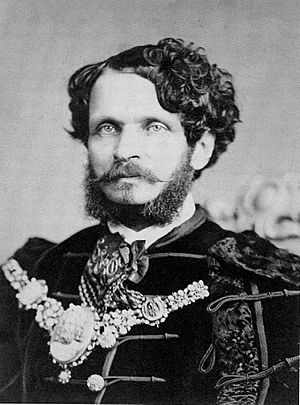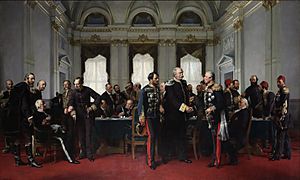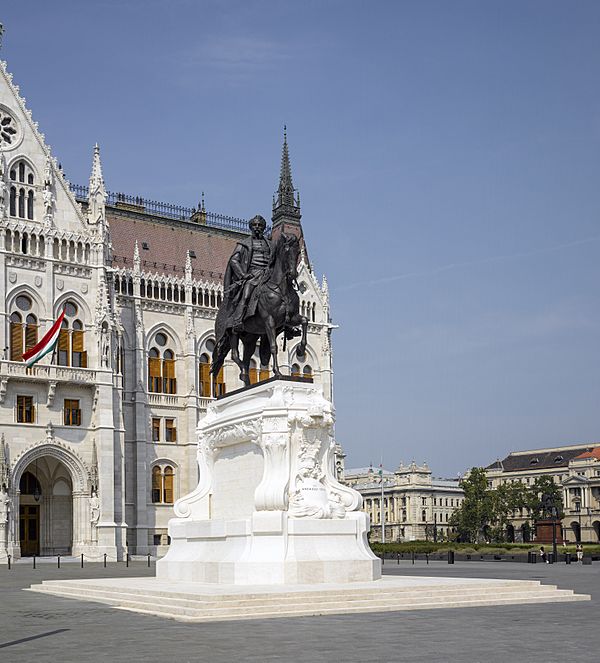Gyula Andrássy facts for kids
Quick facts for kids
Gyula Andrássy
de Csíkszentkirály et Krasznahorka
|
|
|---|---|
 |
|
| Prime Minister of the Kingdom of Hungary | |
| In office 17 February 1867 – 14 November 1871 |
|
| Monarch | Franz Joseph I |
| Preceded by | Bertalan Szemere |
| Succeeded by | Menyhért Lónyay |
| Foreign Minister of Austria-Hungary | |
| In office 14 November 1871 – 8 October 1879 |
|
| Preceded by | Count Friedrich Ferdinand Beust |
| Succeeded by | Baron Heinrich Karl von Haymerle |
| Member of the House of Representatives | |
| In office 17 April 1861 – 22 April 1869 |
|
| Constituency | Sátoraljaújhely |
| Personal details | |
| Born | 3 March 1823 Oláhpatak, Kingdom of Hungary, Austrian Empire (today Vlachovo, Slovakia) |
| Died | 18 February 1890 (aged 66) Volosca, Austria-Hungary (today Volosko, Croatia) |
| Nationality | Hungarian |
| Political party | Deák Party |
| Spouse | Katinka Kendeffy |
| Children | Tivadar Ilona Manó Gyula |
| Signature |  |
Count Gyula Andrássy (born March 8, 1823 – died February 18, 1890) was an important Hungarian leader. He served as the Prime Minister of Hungary from 1867 to 1871. After that, he became the Foreign Minister for the entire Austria-Hungary empire from 1871 to 1879. He believed in expanding the empire's influence, especially in Southeast Europe. He saw Russia as a rival because of its own plans to expand.
Contents
His Early Life and Political Start
Gyula Andrássy was born in Oláhpatak, which is now Vlachovo in Slovakia. His father, Count Károly Andrássy, was a liberal, meaning he supported more freedom and change. This was a risky position at the time. Young Gyula quickly joined the political discussions of his day. He always supported the side that wanted more independence for Hungary.
In 1845, he was chosen to lead a group working on managing the Tisza River. A year later, he became well-known for writing strong articles against the government. These articles appeared in a newspaper called Pesti Hírlap. In 1848, he was elected to the Hungarian Parliament, called the Diet.
Fighting for Hungary's Freedom
When a group from Croatia tried to take back a part of Hungary called Međimurje, Andrássy joined the army. He led soldiers from his home county. He fought bravely in important battles like Pákozd and Schwechat in 1848. He also worked closely with a famous general named Artúr Görgei.
Towards the end of the war, Andrássy was sent to Constantinople (modern-day Istanbul). His mission was to get the Ottoman Empire to stay neutral, or even help, Hungary in its fight against Austria.
After Hungary's defeat at Világos, Andrássy had to leave the country. He lived in London and Paris for ten years. In 1851, the Austrian government sentenced him to death while he was away. During his time in exile, he learned a lot about European politics and diplomacy.
Returning to Politics
Andrássy came back to Hungary in 1858. Even though he hadn't asked for forgiveness from the Austrian government, he strongly supported Ferenc Deák's political party. Deák was a key figure in Hungary's push for more independence.
In 1865, Andrássy became the vice-president of the Diet. The next year, he helped create the Austro-Hungarian Compromise of 1867. This was a very important agreement that created the Dual Monarchy of Austria-Hungary. He was known for being able to convince the Austrian court about Hungary's demands.
In 1866, Austria lost a war against Prussia. After this, Emperor Franz Joseph I asked Andrássy for advice. Andrássy suggested bringing back Hungary's constitution. He also recommended having separate ministers for foreign affairs and defense.
Becoming Prime Minister
On February 17, 1867, Emperor Franz Joseph I appointed Gyula Andrássy as the first Prime Minister of the Hungarian part of the new Austria-Hungary. Ferenc Deák, who was the first choice, turned down the job and said Andrássy was the right person for it.
As Prime Minister, Andrássy was strong and skilled in debates. He quickly became a respected leader. He was in charge of the military and foreign affairs. He helped reorganize the Hungarian army, known as the Honvéd. He often said that managing the military border regions was the hardest part of his job.
When the Franco-Prussian War started in 1870, Andrássy insisted that Austria-Hungary remain neutral. He argued that it was not in Austria's interest to try to regain its old power in Germany.
Foreign Minister of Austria-Hungary
In 1871, Andrássy became the Foreign Minister of Austria-Hungary. This was a major change. Before him, the foreign minister had been against Germany and friendly with Russia. Andrássy took the opposite approach. He wanted to improve relations with Germany.
Austria-Hungary had lost influence in Italy and Germany. This meant its future focus would be on the Near East, a region where many different groups were forming their own nations. The big question was whether these groups would become truly independent or just switch from one ruler to another.
Andrássy helped Austria-Hungary regain its important place in Europe. He worked to build better relationships with Germany, Italy, and Russia through meetings in various cities.
The "Andrássy Note"
Austria-Hungary's renewed influence was clear during talks about problems in Bosnia in 1875. The leaders of Austria, Germany, and Russia agreed on how to handle the "Eastern Question." Their ideas were put into a message called the "Andrássy Note." Andrássy sent this note on December 30, 1875.
In the note, he explained that efforts to stop the revolt in Bosnia were failing. He also pointed out that the Ottoman Empire's promises of reform were not being kept. To prevent a bigger conflict, he urged European powers to work together. They needed to pressure the Ottoman Empire to keep its promises.
The note suggested important changes:
- Allowing Christians to practice their religion freely.
- Ending unfair tax collection.
- In Bosnia and Herzegovina, where land ownership was also an issue, Christian farmers should become free landowners. This would free them from being controlled by Muslim landowners.
- Setting up elected local councils in Bosnia and Herzegovina.
- Appointing judges for life and protecting individual freedoms.
- Creating a group of Muslims and Christians to make sure these changes happened.
Britain and France agreed to this plan, and the "Andrássy Note" became the basis for discussions.
The Congress of Berlin
When war between Russia and the Ottoman Empire became unavoidable, Andrássy made an agreement with Russia. If Russia won, Austria-Hungary's position would not be harmed. However, after Russia's victory and the Treaty of San Stefano, Russia seemed to gain too much power in the Near East. Andrássy, along with Germany and Britain, agreed that a European meeting was needed to settle things.
At the Congress of Berlin in 1878, Andrássy was Austria's main representative. He worked to reduce Russia's gains and increase Austria-Hungary's influence. Before the Congress, he had already agreed with Britain that Austria would support Britain's demands, and Britain would support Austria's plans for Bosnia-Herzegovina.
Andrássy secured the right for Austria-Hungary to occupy and administer Bosnia-Herzegovina. He also got the right to place soldiers in the Sanjak of Novi Pazar. This area helped keep Serbia and Montenegro separate. It also opened a path for Austria-Hungary to expand its influence further into the Balkans.
However, this occupation was not popular in Hungary. People worried about the cost and many Hungarians felt sympathy for the Ottoman Empire.
Andrássy decided to resign as Foreign Minister on October 8, 1879. The day before he left office, he signed an important alliance with Germany. This agreement helped stabilize Austria-Hungary's foreign relations for the future.
Later Years and Legacy
Even after retiring, Andrássy remained active in public life. He supported changes to the Hungarian House of Magnates (a part of the parliament) in 1885. He also strongly defended the 1867 Compromise and the common army. He passed away on February 18, 1890, at the age of 66. His death was seen as a great loss for the nation. There is a plaque dedicated to him in Volosko, Croatia, where he died.
Andrássy was the first Hungarian leader in centuries to hold such an important position in Europe. People said he combined the qualities of a Hungarian nobleman with a modern gentleman. His personal motto was: "It is hard to promise, but it is easy to perform."
His Family Life
Andrássy married Countess Katinka Kendeffy in Paris in 1856. They had two sons, Tivadar (born 1857) and Gyula (born 1860), and one daughter, Ilona (born 1858). Both of his sons became important figures in Hungarian politics. Tivadar became the vice-president of the Hungarian parliament's Lower House. Gyula also had a successful political career.
Awards and Recognition
Gyula Andrássy received many honors and awards from different countries:
 Austria-Hungary:
Austria-Hungary:
- Grand Cross of the Royal Hungarian Order of St. Stephen, 1867
- Knight of the Golden Fleece, 1877
 Baden: Knight of the House Order of Fidelity, 1873
Baden: Knight of the House Order of Fidelity, 1873 Bavaria: Knight of St. Hubert, 1873
Bavaria: Knight of St. Hubert, 1873 Belgium: Grand Cordon of the Order of Leopold
Belgium: Grand Cordon of the Order of Leopold France: Grand Cross of the Legion of Honour
France: Grand Cross of the Legion of Honour Greece: Grand Cross of the Redeemer
Greece: Grand Cross of the Redeemer Italy: Knight of the Annunciation, 28 November 1873
Italy: Knight of the Annunciation, 28 November 1873 Sovereign Military Order of Malta: Bailiff Grand Cross of Honour and Devotion
Sovereign Military Order of Malta: Bailiff Grand Cross of Honour and Devotion Netherlands: Grand Cross of the Netherlands Lion
Netherlands: Grand Cross of the Netherlands Lion Ottoman Empire: Order of the Medjidie, 1st Class in Diamonds
Ottoman Empire: Order of the Medjidie, 1st Class in Diamonds Persia: Order of the August Portrait, in Diamonds
Persia: Order of the August Portrait, in Diamonds Portugal: Grand Cross of the Tower and Sword
Portugal: Grand Cross of the Tower and Sword Prussia: Knight of the Black Eagle, 10 September 1872
Prussia: Knight of the Black Eagle, 10 September 1872 Russian Empire:
Russian Empire:
- Knight of St. Andrew, 1874
- Knight of St. Alexander Nevsky
- Knight of the White Eagle
- Knight of St. Anna, 1st Class
- Knight of St. Stanislaus, 1st Class
 Saxony: Knight of the Rue Crown, 1872
Saxony: Knight of the Rue Crown, 1872 Siam: Grand Cross of the Crown of Siam
Siam: Grand Cross of the Crown of Siam Württemberg: Grand Cross of the Württemberg Crown, 1874
Württemberg: Grand Cross of the Württemberg Crown, 1874
See also
 In Spanish: Gyula Andrássy para niños
In Spanish: Gyula Andrássy para niños
- Andrássy Castle
 | Victor J. Glover |
 | Yvonne Cagle |
 | Jeanette Epps |
 | Bernard A. Harris Jr. |



